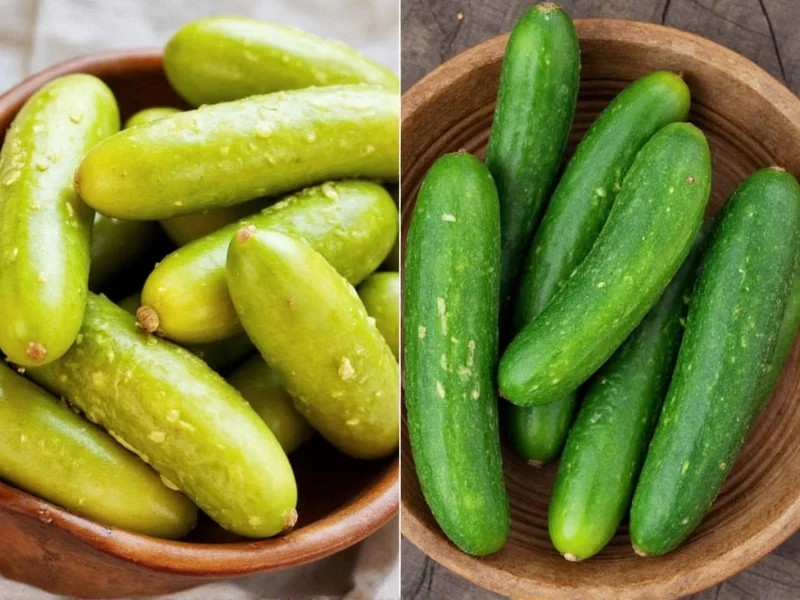Understanding the distinction between pickles vs cucumbers begins with recognizing that pickles start as cucumbers but become something different through processing. This common kitchen confusion stems from the simple fact that all pickles begin as cucumbers, but not all cucumbers become pickles. The transformation occurs during the pickling process, where cucumbers are preserved in a solution typically containing vinegar, salt, water, and various spices.
Cucumbers belong to the Cucurbitaceae family and grow as fresh produce on vines. They're composed of about 95% water and provide hydration along with vitamins K and C. In their natural state, cucumbers have a mild flavor and crisp texture that makes them popular in salads and fresh preparations. When people ask about the difference between pickles and cucumbers, they're often surprised to learn that pickles represent cucumbers that have been chemically altered through fermentation or acidification.
What Exactly Are Pickles?
The term "pickle" refers to any vegetable preserved through pickling, though in American English it specifically denotes pickled cucumbers. True pickles undergo one of two preservation methods: fermented pickles use saltwater brine and natural bacteria to create lactic acid over weeks, while quick-process pickles use vinegar for immediate preservation. This chemical transformation changes both the nutritional profile and flavor characteristics significantly.
Nutritional Comparison: Cucumbers vs Pickles
| Nutrient (per 100g) | Cucumber (raw) | Dill Pickles (fermented) | Sweet Pickles (vinegar-brined) |
|---|---|---|---|
| Calories | 15 | 11 | 16 |
| Total Fat | 0.1g | 0.2g | 0.2g |
| Sodium | 2mg | 1,100mg | 1,200mg |
| Total Carbohydrates | 3.6g | 2.1g | 3.8g |
| Sugar | 1.7g | 0.9g | 3.0g |
| Fiber | 0.5g | 1.0g | 0.9g |
| Vitamin K | 16.4mcg | 13.1mcg | 6.2mcg |
| Probiotics | None | Abundant | None |
This nutritional comparison of pickles and cucumbers reveals significant differences despite their shared origin. The pickling process dramatically increases sodium content while reducing certain vitamins. Fermented pickles develop beneficial probiotics absent in both fresh cucumbers and vinegar-brined varieties. When considering health benefits of cucumbers vs pickles, fresh cucumbers provide superior hydration and lower sodium, while fermented pickles offer gut health advantages through probiotic bacteria.
Types of Cucumbers Used for Pickling
Not all cucumber varieties work equally well for pickling. Kirby cucumbers, the standard for commercial pickles, have thick skins and crisp flesh that withstand brining. Other suitable varieties include:
- Pickling cucumbers - Specifically bred for preservation
- Gherkin cucumbers - Small varieties ideal for cornichons
- English cucumbers - Sometimes used for specialty pickles despite thinner skins
Regular slicing cucumbers often become too soft during pickling due to higher water content. Understanding how are pickles made from cucumbers helps explain why specific cucumber types work best for different pickle varieties.
Common Misconceptions Clarified
Several persistent myths surround the relationship between pickles and cucumbers. Many people wonder: are pickles just pickled cucumbers? The answer is yes for standard pickles, but the term "pickle" technically applies to any pickled vegetable. In North America, however, "pickle" without specification refers exclusively to pickled cucumbers.
Another frequent question involves whether pickles count as vegetables. Nutritionally, they derive from vegetables but their high sodium content and processing mean they don't provide the same nutritional benefits as fresh produce. When examining cucumber vs pickle nutrition facts, the dramatic sodium increase in pickles becomes the most significant dietary consideration for health-conscious consumers.
Culinary Applications and Storage
Fresh cucumbers typically last 7-10 days refrigerated, while properly canned pickles maintain quality for 1-2 years unopened. This extended shelf life represents one of the original purposes of pickling. Culinary uses differ significantly:
- Cucumbers - Best for fresh salads, sandwiches, infused waters, and cold soups
- Fermented pickles - Ideal as probiotic-rich condiments, burger toppings, and charcuterie components
- Vinegar-brined pickles - Perfect for quick snacks, relishes, and adding acidity to dishes
The flavor transformation during pickling creates complex taste profiles ranging from sour dill to sweet bread-and-butter varieties. This versatility explains why understanding the difference between pickles and cucumbers matters for both home cooks and professional chefs.
Health Considerations
When evaluating health benefits of cucumbers vs pickles, each offers distinct advantages. Fresh cucumbers provide excellent hydration and contain antioxidants like flavonoids and tannins. Pickles, particularly fermented varieties, contribute beneficial bacteria for gut health but come with substantially higher sodium levels that may concern those with hypertension.
For individuals monitoring sodium intake, rinsing pickles before consumption can reduce sodium content by up to 30%. Those seeking the probiotic benefits without excessive salt might prefer fermented pickles over vinegar-brined varieties. Understanding these nuances helps answer the common question about nutritional comparison of pickles and cucumbers for health-conscious consumers.











 浙公网安备
33010002000092号
浙公网安备
33010002000092号 浙B2-20120091-4
浙B2-20120091-4